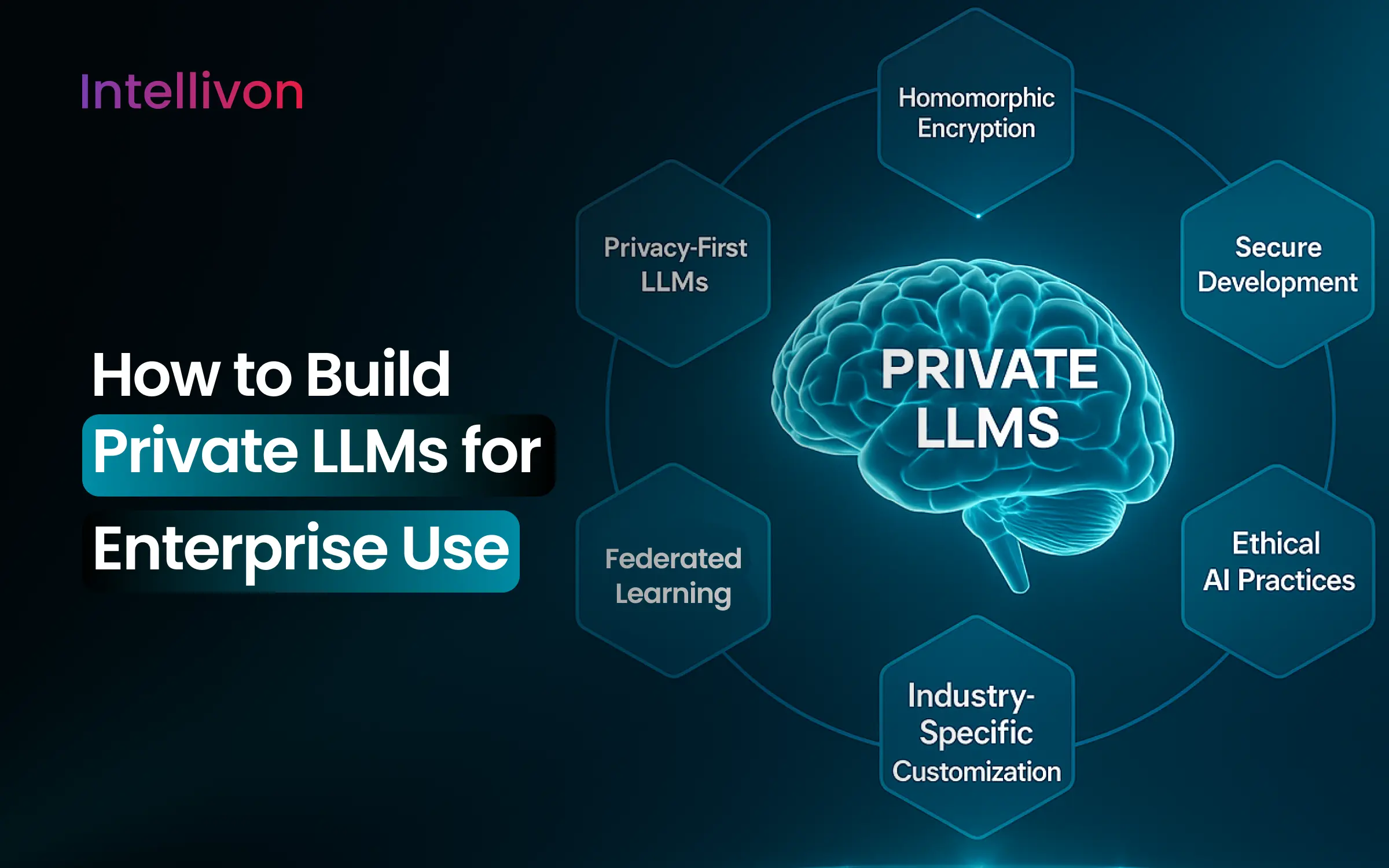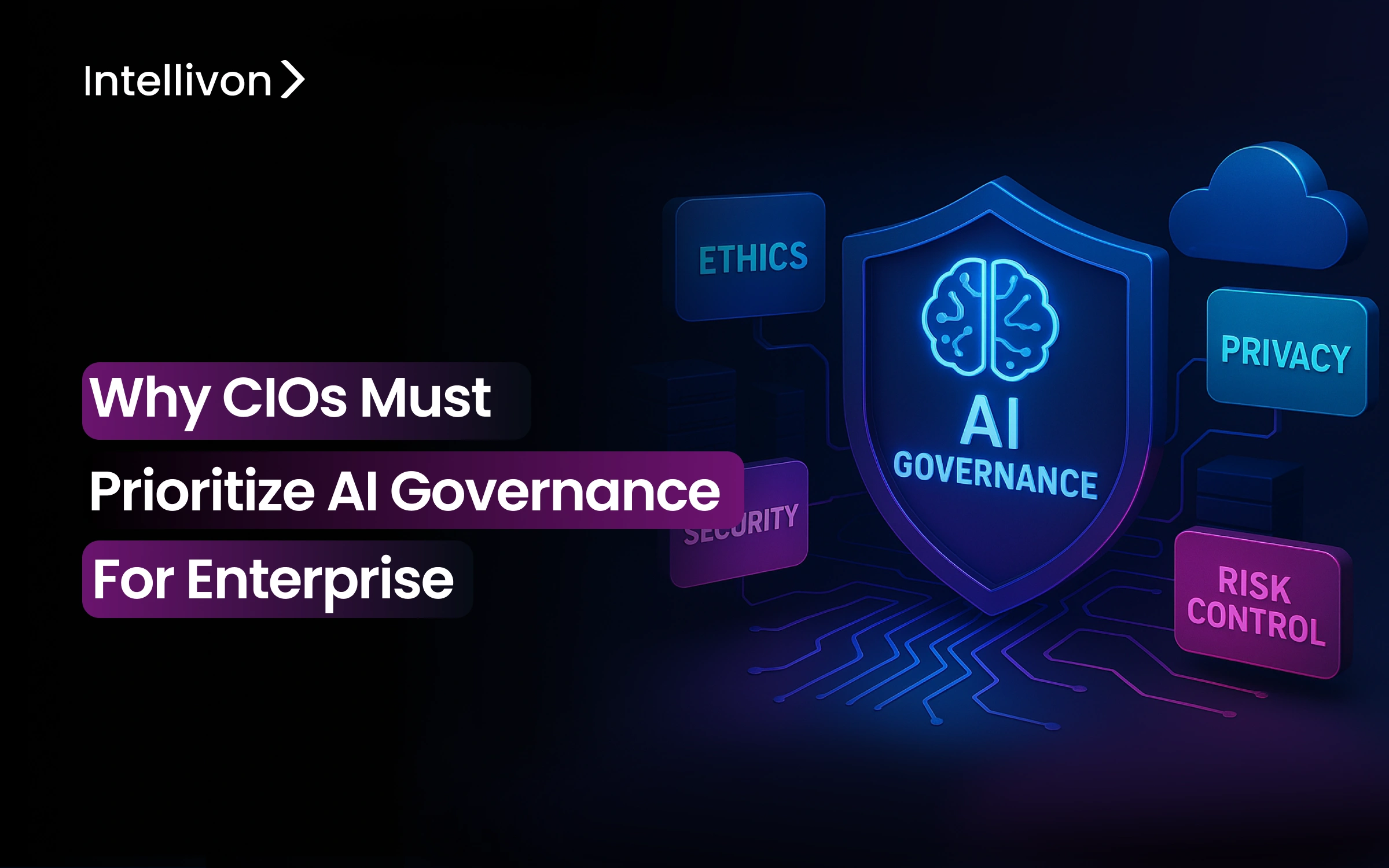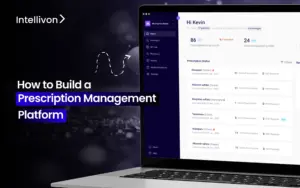AI adoption across enterprises is skyrocketing, but so are the potential risks, and that is why CIOs can no longer afford to overlook AI governance. This urgency has overspilled the need for compliance and has spread to the importance of safeguarding the future of businesses. The need for clear governance frameworks is no longer optional. It’s essential to ensure AI is used responsibly, transparently, and ethically within your organization.
Unregulated AI systems can lead to data breaches, biased decisions, and even violations of privacy laws. Robust and scalable AI-powered governance frameworks customized to enterprise needs are essential to ensure scalability without compromising security. We have partnered with global companies that were facing frequent data breaches and built them customized, stable, and scalable AI governance frameworks. These have resulted in forward-thinking enterprises that earn higher ROI and strive for growth without the burden of security weighing on them. This blog will explore why AI governance should be a top priority for CIOs and how Intellivon can help build customized enterprise-grade AI governance frameworks for enterprises.
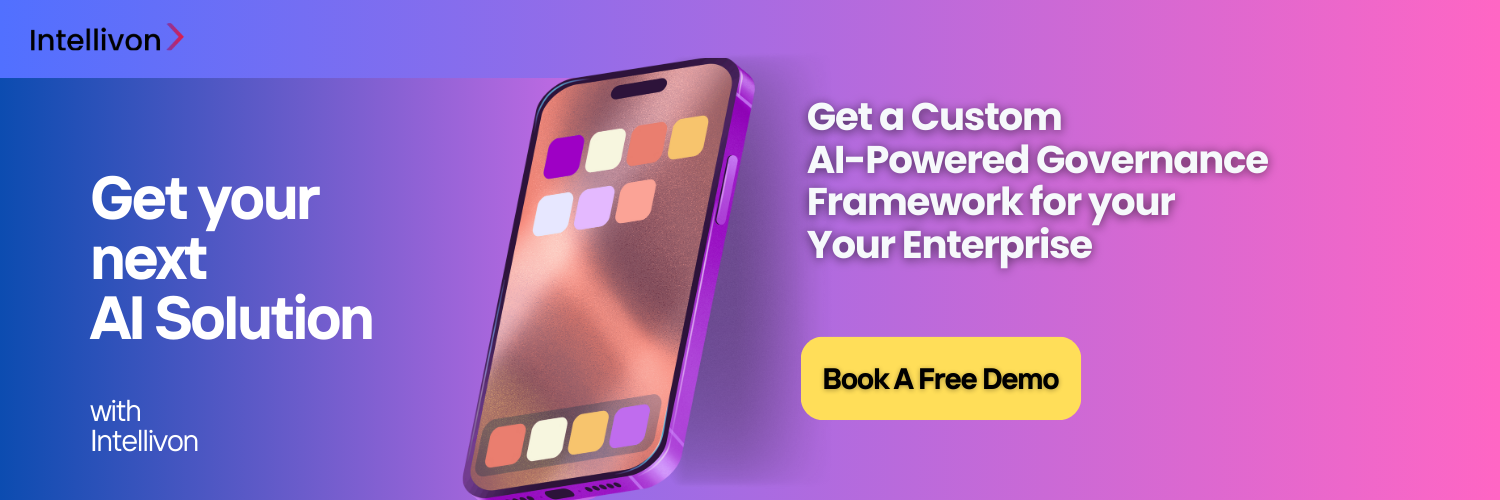
What is AI Governance and Why Are Enterprises Adopting It?
AI governance is a set of rules and systems that guide how companies use AI. It includes frameworks, policies, and oversight to make sure AI is used in a safe and responsible way. This means setting ethical standards, following laws, and managing risks.
AI governance covers every stage of AI, from design to launch and beyond. It ensures that AI tools are trained, tested, used, and improved in line with company values and legal requirements. In short, robust AI governance helps organizations use AI to its full potential for necessary business operations while avoiding harm.
Key Takeaways of the AI Governance Market
The global AI governance market is expected to grow rapidly, from $309 million in 2025 to about $4.83 billion by 2034, at a CAGR of 35.7%, according to Precedence Research. Large companies, mainly in finance, healthcare, and tech, make up about 70% of the market because they face more complex regulations.
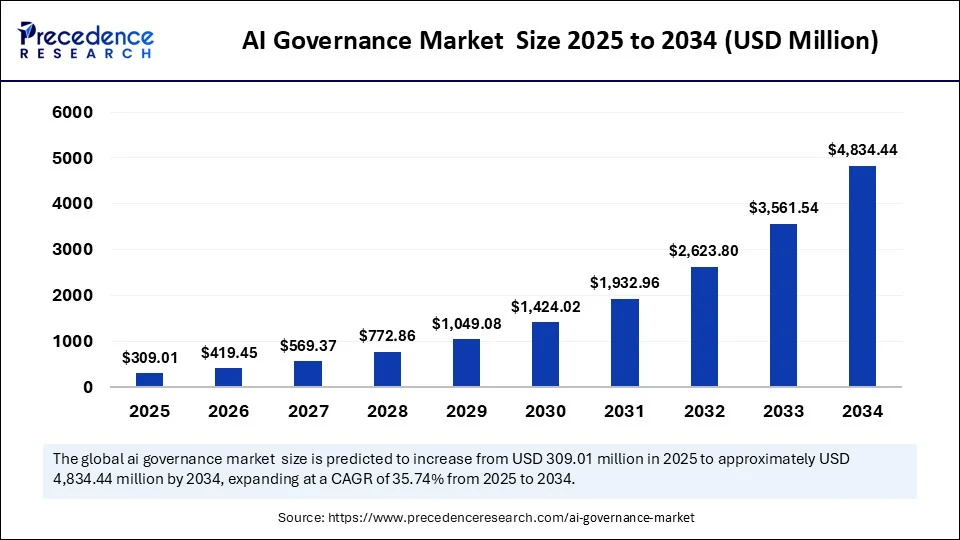
Credit: Precedence Research
- North America leads with 31% of the market in 2024, thanks to strong regulations and digital infrastructure.
- Big companies in finance, healthcare, and defense hold about 70% of the market.
- Market growth is driven by more global AI use and new regulations to manage risks like bias, privacy, and security.
Why AI Governance is an Enterprise Imperative
As AI continues to reshape the way businesses operate, it’s crucial for CIOs to prioritize AI governance. Without proper governance, AI systems can introduce serious risks, from unethical decision-making to regulatory non-compliance. In this rapidly evolving landscape, having a robust governance framework is essential for safeguarding your business and its future.
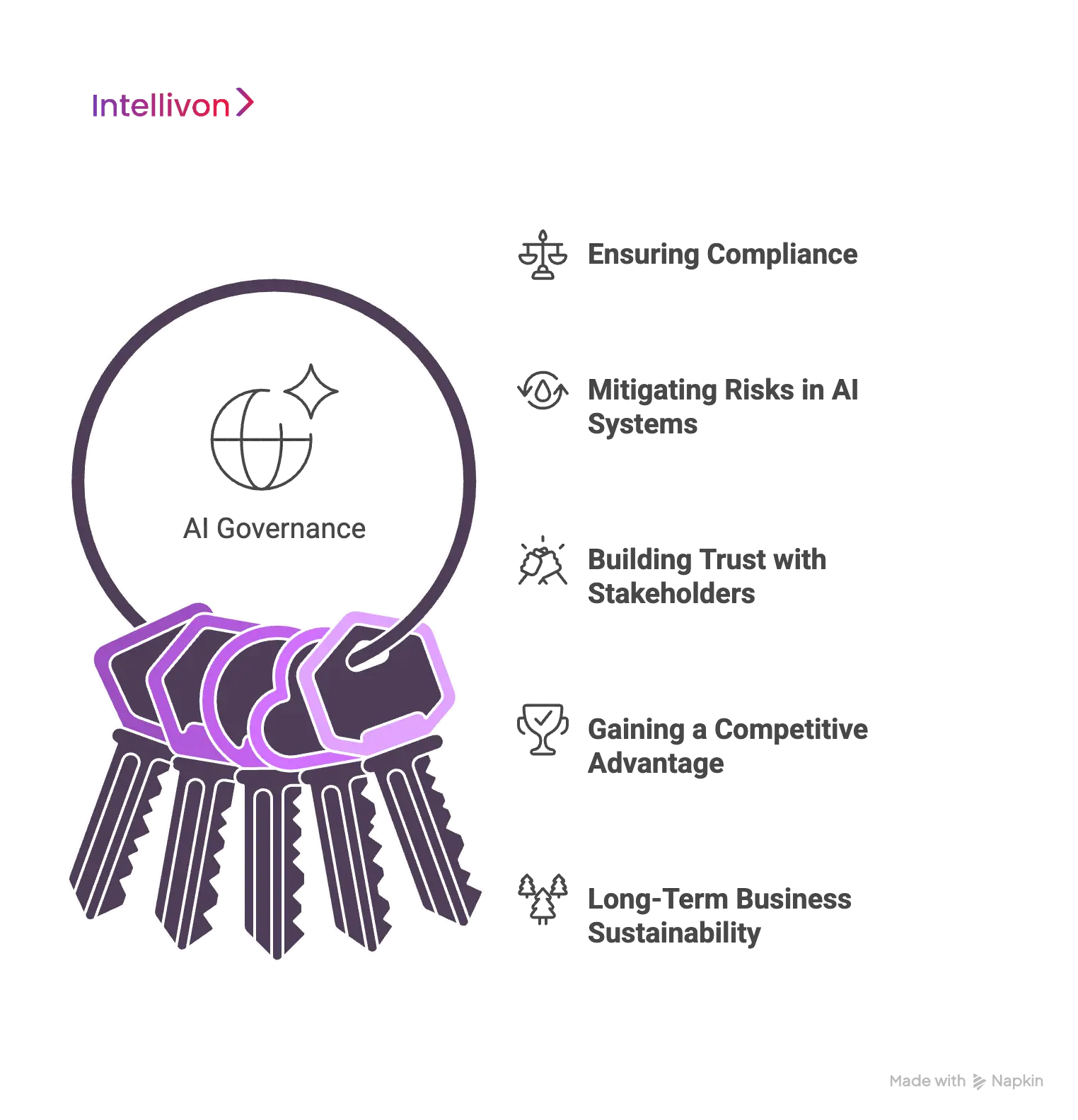
1. Ensuring Compliance
AI governance is essential for staying compliant with increasingly complex regulations. Laws like GDPR require enterprises to ensure their AI systems handle personal data securely and transparently. Non-compliance can lead to hefty fines and significant reputational damage. By implementing proper governance, companies can avoid legal complications and ensure they meet data privacy standards.
2. Mitigating Risks in AI Systems
AI systems can present various risks, including data breaches and bias in decision-making. Without governance, these risks escalate quickly, exposing businesses to security threats or ethical violations. AI governance ensures that systems are secure, data is handled responsibly, and decisions are free from bias, ultimately protecting the company from costly errors.
3. Building Trust with Stakeholders
Adopting strong AI governance builds trust with customers, investors, and partners. Transparency in how AI systems operate and make decisions fosters confidence in the business. When stakeholders see that an enterprise is committed to ethical and responsible AI use, they are more likely to support it, creating stronger business relationships.
4. Gaining a Competitive Advantage
Enterprises that implement effective AI governance are seen as leaders in their industries. By ensuring their AI systems are ethical, compliant, and transparent, these businesses differentiate themselves from competitors. Strong governance not only protects the company but also attracts customers, partners, and investors who value ethical AI practices.
5. Long-Term Business Sustainability
AI governance is key to long-term business success. By proactively managing AI systems, companies can avoid future risks and adapt to changing regulations. This ensures that AI systems remain compliant and relevant, enabling businesses to scale their AI initiatives with confidence and secure long-term growth.
Key Challenges Enterprise CIOs Face in AI Governance
Implementing AI governance is essential, but it’s not without its challenges. For CIOs in large enterprises, managing AI systems effectively requires navigating complex issues like expertise gaps, resource allocation, and the evolving nature of AI technology.
Understanding these challenges is crucial to developing a governance framework that protects the business and ensures AI operates responsibly.
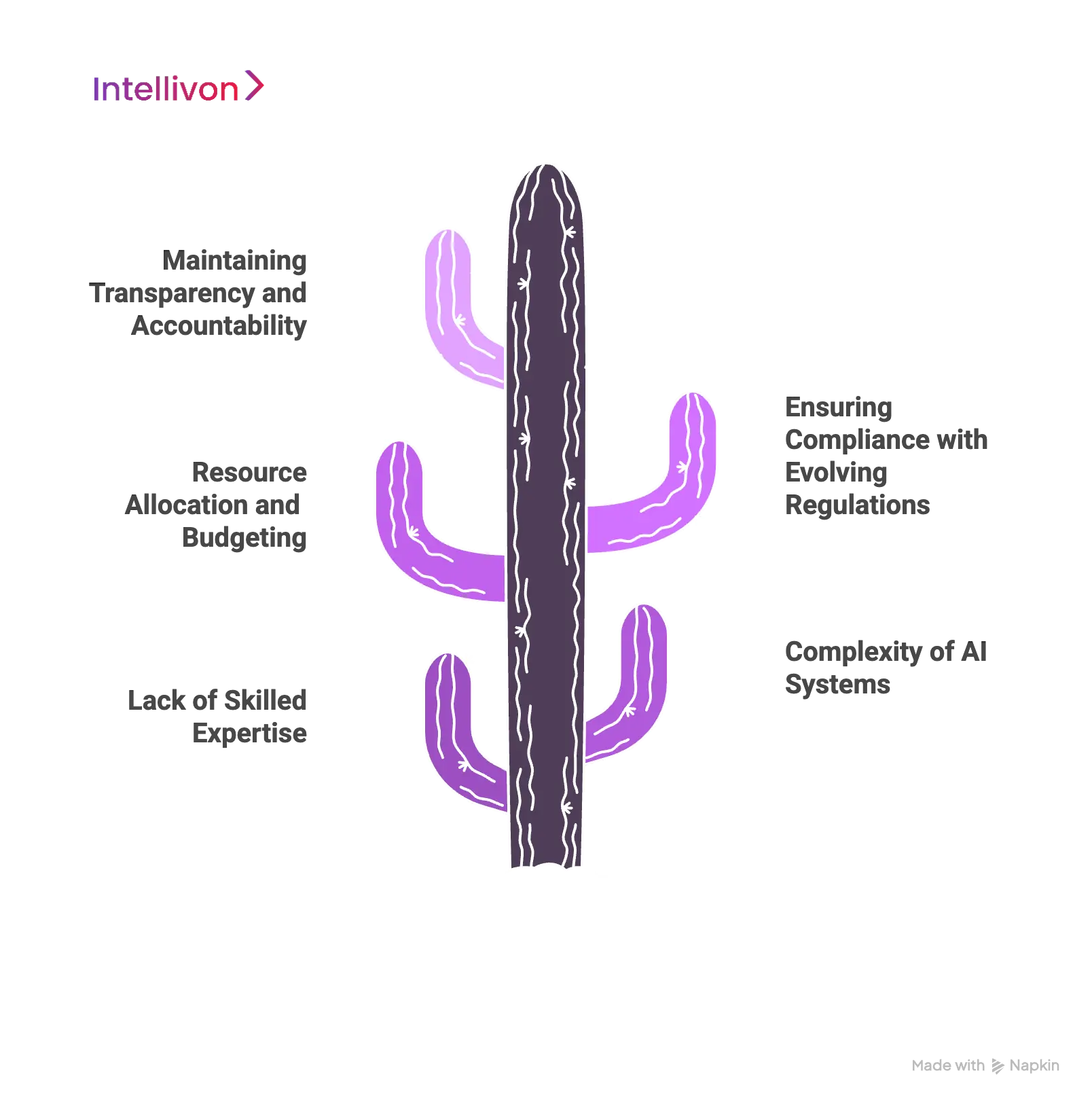
1. Lack of Skilled Expertise
One of the biggest hurdles in AI governance is the lack of skilled experts. AI technology is highly specialized, and understanding its complexities requires a deep understanding of both technical and ethical considerations.
Many organizations struggle to find or train professionals who can effectively manage AI systems while ensuring compliance and ethical standards.
As AI continues to evolve, this skills gap becomes more pronounced, making it harder for enterprises to stay ahead of potential governance risks.
2. Complexity of AI Systems
AI systems are often highly complex, with numerous algorithms, data sources, and outcomes to manage.
This complexity makes it difficult to monitor and govern AI effectively. It’s not just about ensuring that AI models are working properly; it’s about making sure they remain ethical, transparent, and fair across all their applications.
For CIOs, creating a framework that manages this complexity and provides clear oversight across different departments and AI use cases is a significant challenge.
3. Resource Allocation and Budgeting
Building a comprehensive AI governance framework requires both financial investment and time resources.
For many enterprises, allocating enough resources to governance initiatives can be a challenge, especially when competing with other critical business priorities.
However, without the necessary investment in governance, the risk of non-compliance, ethical failures, and even security breaches increases. Balancing these demands while keeping costs in check is a constant challenge for CIOs.
4. Ensuring Compliance with Evolving Regulations
The regulatory landscape for AI is evolving quickly, with new rules and guidelines emerging constantly.
Keeping up with these changes and ensuring that AI systems comply with local and global regulations like GDPR or emerging AI frameworks can be overwhelming. The fast pace of these changes means that what is compliant today may not be compliant tomorrow.
As regulations tighten, CIOs must ensure their AI governance strategies are flexible enough to adapt quickly, which requires constant monitoring and adjustment.
5. Maintaining Transparency and Accountability
Another major challenge is ensuring that AI systems remain transparent and accountable throughout their lifecycle. Many AI systems operate as “black boxes,” where it’s difficult to understand how decisions are made.
This lack of transparency can make it harder for organizations to ensure that their AI systems are operating ethically and in compliance with regulatory standards.
Creating clear accountability structures and making AI operations understandable is crucial for responsible governance, but it requires ongoing effort and the right governance tools.
Intellivon’s AI governance solutions address the key challenges that CIOs face, offering a clear path to compliant, ethical, and efficient AI operations. With our expertise, innovative tools, and tailored frameworks, we empower your organization to leverage AI responsibly while minimizing risks and maximizing benefits.
How Our AI Governance Frameworks Enhance Enterprise Efficiency and Security
Intellivon’s AI governance frameworks are built to tackle the unique challenges large enterprises face, such as system complexity, resource constraints, and evolving regulations. Here’s how we make AI governance framework adoption effortless and effective for your organization.
1. Tailored Integration into Existing Systems
A major challenge CIOs face is integrating new governance frameworks with existing systems. Intellivon takes a tailored approach to integration, recognizing that every enterprise has unique infrastructure needs. Our AI governance frameworks complement and enhance your current AI and IT systems, ensuring no disruptions to ongoing operations.
Whether you’re managing data pipelines, cloud-based models, or legacy systems, our frameworks integrate seamlessly into your tech stack. We work closely with your IT team to customize the integration, ensuring efficiency and maximum value while minimizing disruptions.
2. Scalability for Growing Enterprises
As enterprises grow, their AI initiatives become more complex. This expansion can make it difficult to maintain effective governance. At Intellivon, we design AI governance frameworks with scalability in mind. Our frameworks are built to evolve with your business, whether you’re adding new AI systems, expanding into new markets, or handling increasing data volume.
Our modular frameworks ensure that governance tools can scale across business units and geographies, allowing you to maintain consistent governance without constant adjustments. This adaptability ensures that governance stays effective as your organization grows.
3. Simplified Governance Across Models
Enterprises deploy many types of AI models for different functions, such as customer service or fraud detection. Managing governance across these models can become overwhelming. Intellivon’s AI governance frameworks are designed to handle multiple AI models at once, providing centralized control while allowing flexibility for each model’s unique requirements.
You can set customized rules for each AI model, ensuring compliance with regulations, ethical standards, and business goals. This flexibility ensures consistent governance, regardless of the variety and complexity of your AI use cases.
4. Evolving Regulation Compliance
As AI and data privacy regulations evolve, maintaining governance can become more difficult. Intellivon’s frameworks are designed with future-proofing in mind, so your enterprise doesn’t need to reinvent governance each time new regulations emerge. Our frameworks include built-in compliance tools that automatically adjust to new legal requirements, such as updates to GDPR or new AI-specific laws.
This proactive approach ensures compliance with minimal effort, reducing the risk of penalties. Continuous updates and automated compliance checks ensure that scaling AI governance doesn’t require constant manual intervention.
5. Resource Efficiency and Scaling
Scaling AI governance often demands significant resources, both in time and money. At Intellivon, we focus on providing cost-effective and resource-efficient solutions. Our frameworks maximize automation and reduce the need for manual oversight. This allows you to scale your AI governance without dramatically increasing operational costs.
From automated compliance checks to real-time AI monitoring, Intellivon’s tools help reduce the need for large, dedicated teams. This ensures your AI governance scales without overwhelming your resources.
6. Regional Enterprise Flexibility
For global enterprises, scaling AI governance across regions with different laws and regulations can be challenging. Intellivon’s frameworks are regionally adaptable, ensuring governance that meets local regulatory standards while maintaining global consistency.
This flexibility allows your enterprise to standardize governance practices across different regions, streamlining compliance efforts at both the global and local levels.
Intellivon’s approach to AI governance integration and scalability ensures that your enterprise can confidently adopt and scale AI governance frameworks, no matter the size or complexity of your organization. With our frameworks, you can build a strong, compliant, and adaptable AI foundation that evolves with your business.
How We Build Custom AI Governance Frameworks for Enterprises
At Intellivon, we know that every enterprise has a different story when it comes to AI. Your industry, regulations, technology, and company culture all play a part in shaping your journey. That’s why our AI governance framework is never just an off-the-shelf solution. Instead, we design each framework to fit your unique needs and goals, so you can innovate responsibly and stay competitive.
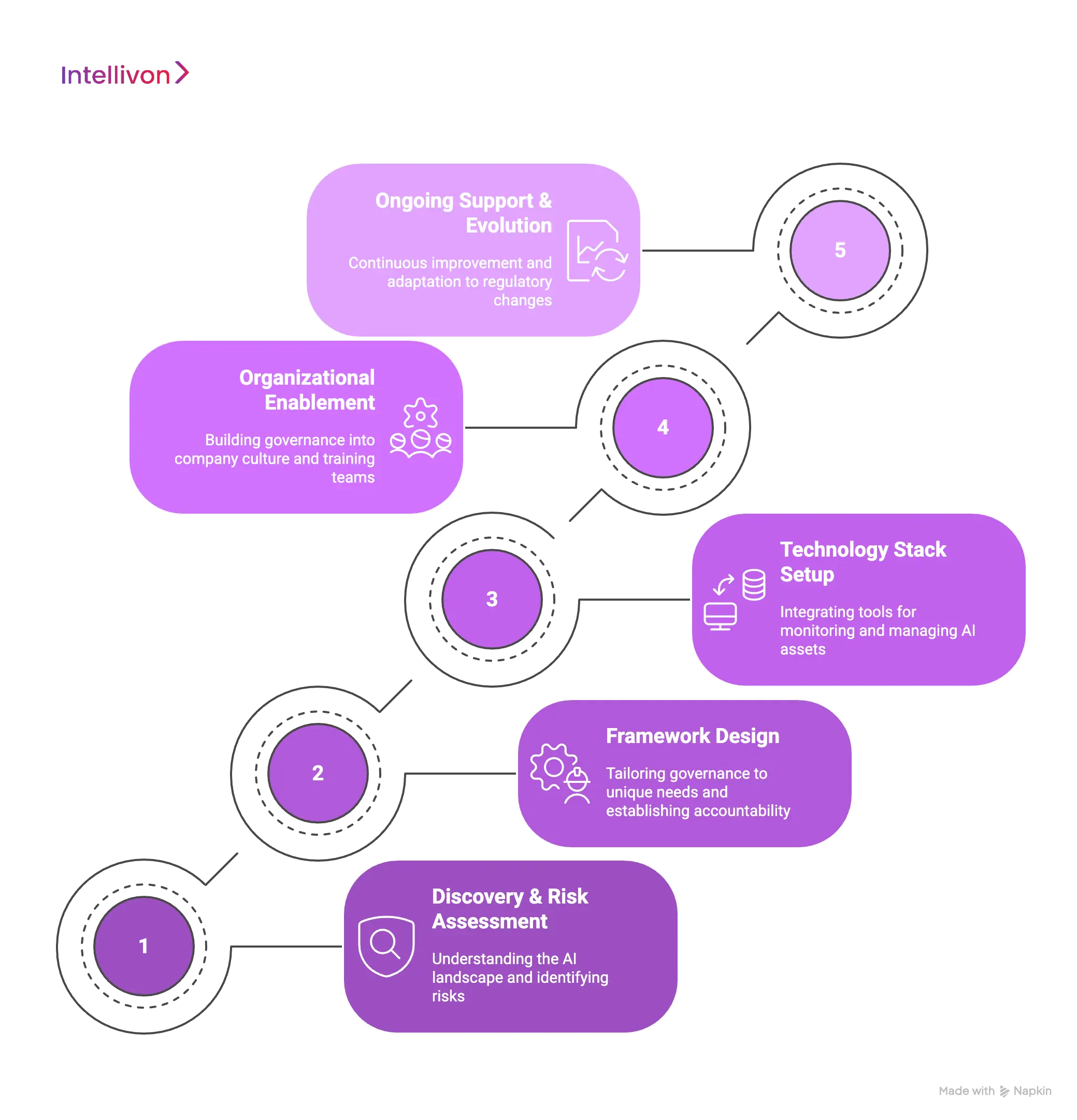
1. Discovery & Risk Assessment
1.1 Understanding Your AI Landscape
We begin by thoroughly analyzing your AI environment. This includes creating an inventory of all AI assets, such as machine learning models, automated tools, and data used across your organization. By understanding your AI systems, we pinpoint where governance is most needed. For instance, if AI is used for credit risk scoring in finance, we will examine how those models work, the data sources, and the responsible teams, ensuring we have clear visibility for better oversight.
1.2 Assessing Regulatory and Ethical Risks
Every enterprise faces regulatory challenges, especially around AI. We assess your industry’s regulatory requirements (such as GDPR, HIPAA, or the EU AI Act) to ensure compliance. We also perform ethical risk assessments, identifying potential biases or fairness issues in AI models, such as discrimination in HR recruitment tools. By uncovering these risks early, we help you avoid costly future problems.
1.3 Engaging Cross-Functional Teams
Effective AI governance requires collaboration across all departments. We engage with key stakeholders from data science, legal, compliance, and business teams through workshops and interviews. This ensures that the governance framework we design is practical, accepted across the organization, and aligned with business needs.
2. Framework Design
2.1 Tailoring Governance to Your Needs
With a deep understanding of your AI landscape, we begin crafting a custom AI governance framework tailored to your enterprise’s priorities. Whether the focus is on compliance, building trust, or minimizing operational risk, we ensure that the governance structure aligns with your goals. We also prioritize the AI models that require the most oversight, such as those used in critical sectors like healthcare or finance.
2.2 Establishing Clear Accountability
Effective governance relies on clear responsibility. We define roles such as AI risk owners, model stewards, and ethics officers, with clear duties and escalation paths. This ensures that when issues arise, the right people are accountable, ensuring quick and efficient resolution.
2.3 Embedding Ethics and Compliance
Our frameworks integrate ethics and legal requirements into every part of your governance structure. We define transparency standards, ensure privacy by design, and maintain audit logs and model registries for full traceability. This makes it easy for you to comply with regulatory reporting requirements and demonstrate transparency.
2.4 Adapting to Change
Our AI governance frameworks are designed for agility. We implement change management procedures to ensure that your framework evolves with new regulations and technological advancements, keeping your governance practices up-to-date in a fast-moving landscape.
3. Technology Stack Setup
3.1 Integrating Powerful Governance Tools
We integrate best-in-class AI governance tools to power your framework. This includes tools for bias detection, monitoring model performance, and managing access. Our model registry acts as a central hub for tracking versions, metadata, and ownership across the AI lifecycle, providing a single source of truth for governance.
3.2 Centralizing AI Asset Management
By centralizing all your AI assets in one platform, we simplify the management, auditing, and updating process. Any changes to AI models are logged for future reference, making oversight and compliance reporting easy and transparent.
3.3 Automating Monitoring and Reporting
Our frameworks automate key governance tasks like compliance reporting, drift detection, and anomaly monitoring. Automated alerts notify the right team members if a model deviates from expected performance, ensuring quick intervention to prevent issues. This integration with your security platforms further ensures that privacy is protected and audit trails are maintained.
4. Organizational Enablement
4.1 Building Governance into Company Culture
We help embed AI governance within your organization’s culture by setting up cross-functional governance committees and an AI Governance Center of Excellence. These groups drive responsible AI adoption across the enterprise, ensuring long-term success.
4.2 Training and Empowering Teams
To make governance truly effective, we deliver targeted training programs for developers, compliance officers, legal teams, and business leaders. Developers learn to code ethically, compliance teams master the new frameworks, and leaders understand how governance protects value and builds trust.
4.3 Sustaining Engagement and Alignment
We ensure continuous engagement with regular meetings and communication strategies to keep all stakeholders informed of progress, successes, and the evolving role of AI governance in your organization. This alignment ensures that governance remains relevant and fully integrated into business operations.
5. Ongoing Support & Evolution
5.1 Continuous Improvement and Health Checks
AI governance is an ongoing process. We provide regular audits, maturity checks, and system tuning to ensure your governance framework stays strong and effective. As your business and regulations evolve, we continuously adjust the framework to keep it relevant and operational.
5.2 Keeping Pace with Regulatory Change
Intellivon’s experts continuously track evolving laws and best practices worldwide, providing updates and guidance to ensure that your AI governance remains compliant and robust in the face of regulatory changes.
5.3 Incident Response and Managed Services
In the event of a governance issue, we have formalized processes in place for quick, transparent resolution. For enterprises seeking peace of mind, we offer a fully managed governance-as-a-service option, covering everything from 24/7 monitoring to audit support, so you can focus on innovation while we handle the governance.
At Intellivon, we combine deep AI, regulatory, and ethical expertise with a practical, enterprise-first approach. Our frameworks are built to scale with your organization, ensuring that your AI systems remain compliant, ethical, and aligned with business goals. We support you throughout the entire AI governance journey, from discovery to ongoing management, empowering your enterprise to lead confidently in the AI-driven future.
AI Governance Framework Implementation Challenges and How We Solve Them
Implementing an AI governance framework in a large enterprise is not without its challenges, but they can be mitigated with the right tools, expertise, and a tailored approach. Here’s a look at common implementation challenges and how our frameworks address them.
1. Complex Integration with Existing IT Systems
One of the primary challenges in AI governance implementation is integrating new frameworks into existing IT infrastructures. Large enterprises often rely on legacy systems, diverse platforms, and siloed data. Integrating AI governance with these systems can be difficult and time-consuming.
How We Solve It:
Intellivon’s AI governance frameworks are designed for seamless integration. We work closely with your IT teams to understand your current systems and tailor our solutions to fit your infrastructure.
Our frameworks easily integrate with existing AI models, data pipelines, and cloud environments, minimizing disruptions while ensuring effective governance. By offering modular, scalable solutions, we ensure that your AI governance framework grows and adapts as your enterprise expands, without requiring a complete overhaul of your systems.
2. Ensuring Continuous Compliance
Large enterprises often operate in multiple regions with different regulatory standards for AI and data protection. The challenge is ensuring that AI systems comply with all relevant regulations, such as GDPR, CCPA, or country-specific laws, while keeping track of changes in the regulatory landscape.
How We Solve It:
Intellivon’s AI governance frameworks come equipped with automated compliance tools that adapt to new and evolving regulations. Our solutions ensure that your AI systems remain in full compliance with local, national, and international laws. We provide real-time monitoring and automatic updates to keep your enterprise on track with the latest regulations, reducing the risk of fines and compliance violations.
3. Managing Diverse AI Models
Enterprises often use a wide range of AI models for various applications, from customer service chatbots to fraud detection algorithms. Managing governance for each model can be cumbersome, especially when they serve different functions across business units.
How We Solve It:
Intellivon provides a centralized governance platform that allows enterprises to manage multiple AI models from a single interface. Each AI model can have tailored governance rules, ensuring that it meets both business-specific requirements and overarching ethical and compliance standards.
Our framework also allows for cross-departmental visibility, ensuring all stakeholders are aligned in governance efforts, while providing flexibility to manage AI models independently where necessary.
4. Aligning Governance with Business Objectives
AI governance frameworks can sometimes be seen as a set of rules that add complexity without directly contributing to business goals. This misalignment can lead to resistance from stakeholders and inefficient governance processes.
How We Solve It:
At Intellivon, we design AI governance frameworks that are aligned with your business objectives. We ensure that AI systems are governed in a way that maximizes their impact on business outcomes, helping your teams see the tangible benefits of effective governance.
5. Resource Allocation and Skill Gaps
Implementing and maintaining an AI governance framework requires ongoing resources, both in terms of skilled personnel and financial investment. Large enterprises often face resource constraints or may not have the in-house expertise needed to manage AI governance effectively.
How We Solve It:
Intellivon offers comprehensive support services to ensure that your enterprise has the resources it needs. We provide dedicated expertise, from AI governance experts to technical advisors, helping to fill the skill gaps in your team.
Our frameworks are designed to be automated and efficient, minimizing the ongoing resource investment required. This allows your teams to focus on strategic initiatives while ensuring that AI governance is always up to date and running smoothly.
Implementing AI governance frameworks in large enterprises presents numerous challenges, but they are not insurmountable. At Intellivon, we address these challenges head-on by providing tailored solutions that integrate seamlessly with existing systems, ensure continuous compliance, and align with business objectives.
Established AI Governance Frameworks and Models
As AI becomes more widespread, organizations need strong governance models to balance innovation with ethical and legal responsibilities. Several leading frameworks and models help enterprise CIOs manage AI systems safely and confidently. Here are some of the most recognized approaches:
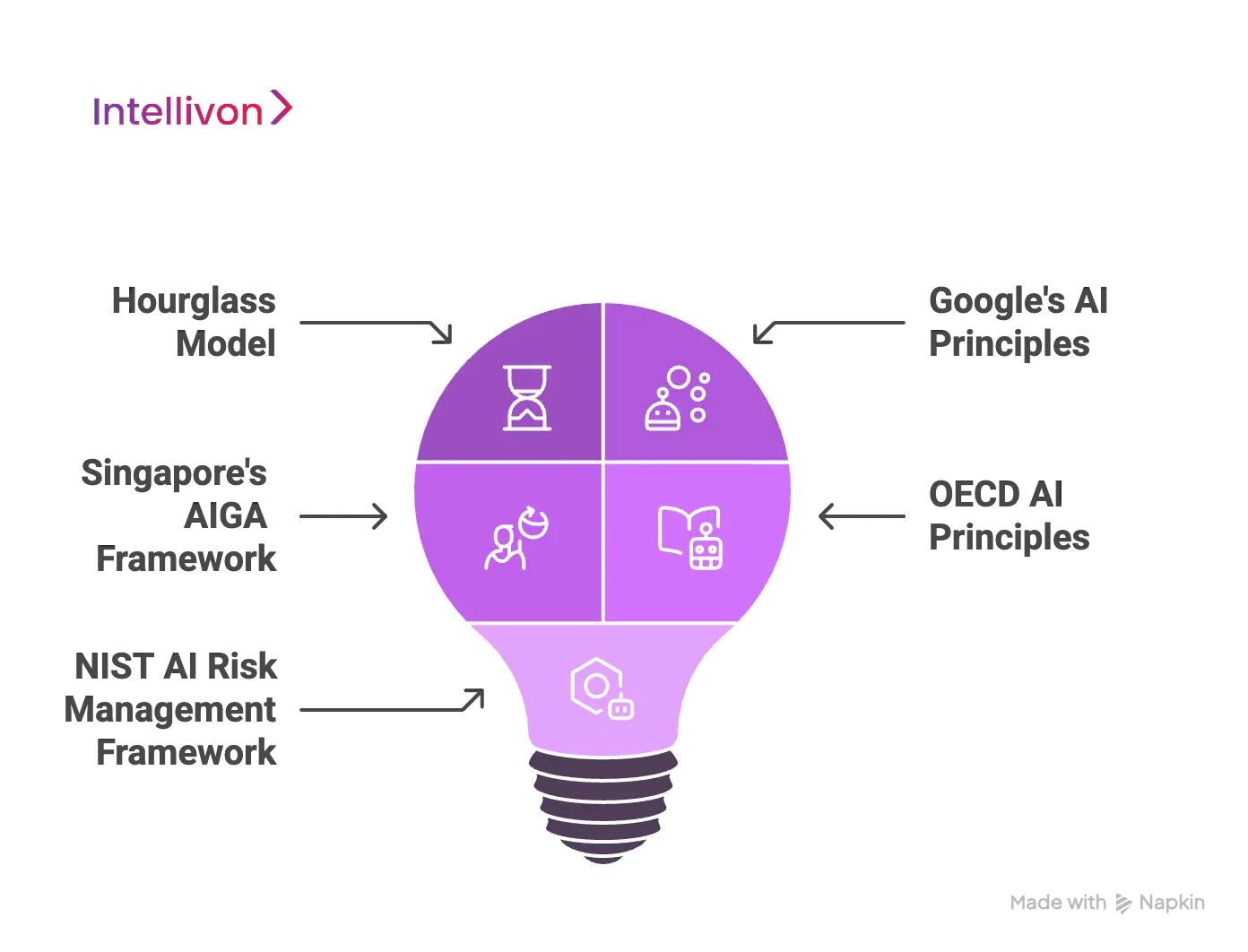
1. The Hourglass Model
The Hourglass Model breaks down AI governance into three main phases: data preparation, model development, and outcome management. It encourages organizations to focus on high-quality data, apply strict controls during model creation, and monitor AI results after deployment. By overseeing the entire AI lifecycle, this model helps prevent problems before they start and supports ongoing responsible AI use.
2. Google’s AI Governance Approach
Google’s approach is built on public AI Principles, highlighting fairness, accountability, and social benefit. Google commits to not building AI for harmful or surveillance purposes and emphasizes that AI systems must always assist, not replace, human decision-making. Their principles also require that AI results are explainable, making the technology more transparent to users and regulators.
3. Singapore’s A.I. Governance (AIGA) Framework
Singapore’s AIGA Framework is a pioneer in national AI governance. It focuses on human-centric AI, explainability, and accountability. The framework encourages companies to follow voluntary guidelines, like ensuring responsible data use and transparent, understandable AI decisions. By making accountability a priority, AIGA builds trust in AI adoption.
4. OECD AI Principles
The OECD’s AI Principles are globally recognized and widely adopted. They cover inclusive growth, human-centered values, transparency, validity and security, and accountability. These principles set the foundation for ethical and sustainable AI use across both public and private sectors, encouraging organizations to reduce risks and maximize social benefit.
5. NIST AI Risk Management Framework
The NIST AI Risk Management Framework helps organizations identify, evaluate, and address risks related to AI. It stresses the importance of continuous risk assessments throughout the AI lifecycle and requires organizations to document any limitations or potential biases in their AI systems. This is especially valuable for industries where mistakes can have major consequences, such as healthcare or finance.
What Regulations Require an AI Governance Framework?
AI regulation is quickly evolving around the world. Some frameworks are legally binding, while others are considered best practices or voluntary guidance. It’s crucial for every organization to know which regulations apply to them.
Here is a summary of key regulations by region:
| Region | Regulation | Governance Required | Binding |
| European Union | EU AI Act | Yes | Yes |
| United States | SR-11-7 (Supervisory Guidance) | Indirectly (for AI in financial models) | No (Guidance) |
| Global | ISO/IEC 42001:2023 | Yes | Voluntary |
| Canada | AIDA (Artificial Intelligence and Data Act) | Yes | Pending Finalization |
| United Kingdom | Pro-innovation AI Regulation Framework | Indirect (Sector-Led) | No (Guidance) |
Staying aware of these frameworks and laws is essential for keeping your AI governance up-to-date, compliant, and future-ready. Intellivon helps enterprises interpret and implement these evolving standards as part of our ongoing partnership.
Conclusion
AI governance is no longer just a compliance necessity; it’s a strategic priority for modern enterprises. By adopting robust AI governance frameworks, CIOs can mitigate risks, enhance efficiency, and foster trust, all while driving innovation.
Prioritizing AI governance ensures that businesses remain competitive, compliant, and ethical, positioning them for long-term success in an increasingly AI-driven world.
Build an Enterprise-Grade AI Governance Framework With Intellivon
Building a robust, scalable, and compliant AI governance framework is essential for any modern enterprise. With over 11 years of experience and more than 500 successful deployments, Intellivon is your trusted partner in transforming your AI governance approach from reactive to proactive.
What Makes Intellivon the Right Choice for AI Governance?
- Industry-Aligned Governance Design: We tailor frameworks to your sector, ensuring they meet regulatory standards and operational needs.
- End-to-End Security and Compliance: Seamlessly integrate governance across on-prem, cloud, and hybrid environments with enterprise-grade security.
- Regulation-Ready Flexibility: Stay ahead of evolving regulations with frameworks that adapt to global standards like GDPR, HIPAA, and the EU AI Act.
- Automated Policy Enforcement: Automate monitoring, compliance reporting, bias detection, and real-time issue escalation.
- Business-Centric Governance: We align AI governance with your business goals to maximize impact, trust, and organizational success.
Let’s Get Started:
Our AI governance experts are ready to help you:
- Conduct a comprehensive audit of your AI landscape.
- Perform a gap analysis and prioritize use cases aligned with your business goals.
- Design a custom governance framework tailored to your infrastructure and regulations.
- Create a roadmap for continuous improvement, compliance automation, and stakeholder engagement.
Book your free strategy call with an Intellivon governance expert today and begin building the secure, transparent, and future-ready AI foundation your enterprise needs to lead with confidence.
FAQ’s
Q1. What is AI governance, and why is it critical for my enterprise?
A1. AI governance refers to policies and frameworks that ensure AI systems operate ethically, securely, and in compliance with regulations. For enterprises, it is critical to reduce risks like data breaches, biased decisions, and regulatory penalties while aligning AI with business goals and maintaining compliance with evolving laws.
Q2. What makes Intellivon’s AI governance frameworks different from other solutions?
A2. Intellivon’s frameworks are tailored to your enterprise’s needs, industry, and regulatory requirements. Unlike generic solutions, we offer industry-specific designs, automated compliance checks, and a future-proof approach that adapts to changing regulations, ensuring long-term scalability and effectiveness.
Q3. How can Intellivon help my enterprise with AI compliance?
A3. Intellivon ensures your AI systems meet local and global regulations like GDPR and HIPAA. Our frameworks include automated compliance checks, audit trails, and continuous monitoring to proactively ensure your systems stay compliant and avoid fines or legal issues.
Q4. What are the risks of not implementing AI governance?
A4. Without AI governance, your enterprise faces risks such as data breaches, biased decisions, non-compliance with laws, and security threats, all of which can result in financial penalties, reputational damage, and loss of customer trust.
Q5. How can I get started with Intellivon’s AI governance solutions?
A5. Getting started is easy! Book a free strategy call with an Intellivon expert. We’ll conduct a comprehensive audit, provide a gap analysis, and develop a custom roadmap to implement a scalable and compliant AI governance framework for your enterprise.

